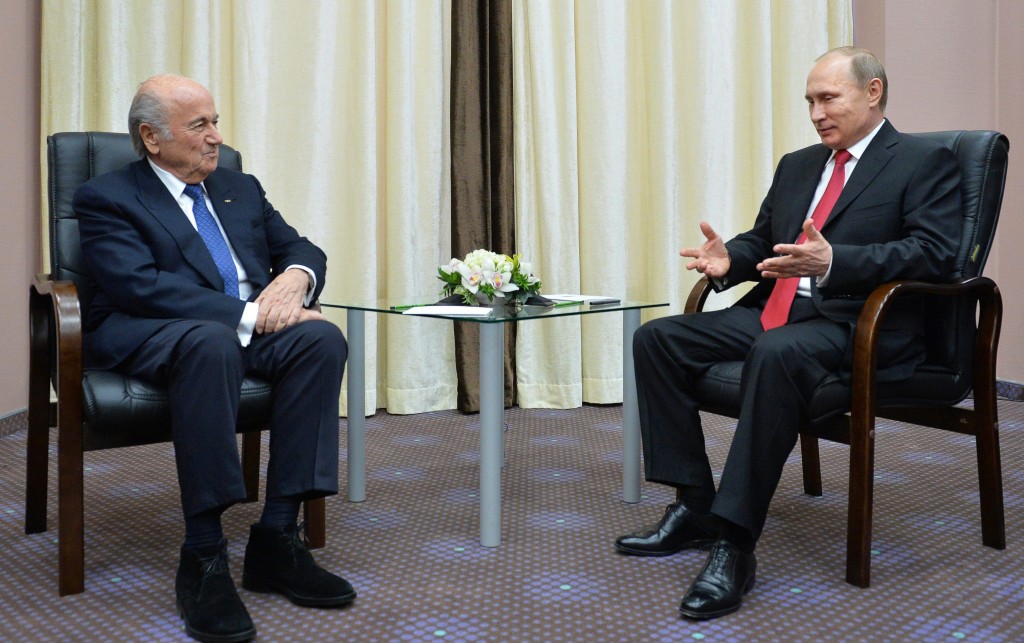With three years to go until the 2018 World Cup final is played in Moscow, preparations around Russia for the tournament are largely on track, in contrast with the worries and delays that preceded the competition in Brazil.
For Russia, the worries are not so much centred around the building of venues as the need to find a new national team coach after Fabio Capello was sacked on Tuesday.
The Russian Football Union have a new rebuilding job to do, just as the construction of stadia continues apace.
“We are ahead of schedule,” declares a proud Marat Khusnullin, Moscow’s Deputy Mayor for Urban Development, with hard hat on as he stands on the pitch at the Russian capital’s Luzhniki Stadium, which will host the World Cup final on July 15, 2018 but is currently peppered with building machinery.
It could scarcely be more different to the repeated delays before Brazil 2014.
Memories are still fresh of the huge worries about the Arena Corinthians in Sao Paulo, the new stadium which staged last year’s opener between Brazil and Croatia having still been a building site just days previously.
Openly very critical of the delays in Brazil, FIFA secretary general Jerome Valcke has been much more relaxed about Russia’s organisation.
“The Russians are doing everything so fast. It’s amazing, they are going quicker than a train,” Valcke said in December last year.
.
Frightening pace
The Luzhniki, the Olympic Stadium when Russia hosted the Games in 1980 which features a colossal statue of Lenin at the entrance, is being rebuilt at a cost of $387 million.
Reconstruction work on the 81,000-seat stadium is due to finish in December 2016.
To ensure that deadline is met, work is going on at a frightening pace, “with 4,000 labourers working in 12-hour shifts, all day, meaning there are always 2,000 people on site,” says Khusnullin.
The ground which staged the 2008 Champions League final, when Manchester United beat Chelsea on penalties, will also host the opening match of the World Cup on June 14, 2018 as well as the second semi-final on July 11.
FIFA have already attributed certain games at the beginning and towards the end of the tournament and will decide where the remaining matches are to be played on July 24, the day before the World Cup preliminary draw is held in Saint Petersburg.
Not all venues are at such an advanced stage as the Luzhniki, however.
In Nizhny Novgorod, 425 kilometres east of Moscow, work has barely begun on a 45,430-seat stadium that it is hoped will be ready in September 2017.
And in Yekaterinburg, a further 1,330 kilometres east of the capital, the stadium dating back to the 1950s is being renovated and is set to be finished in December 2017.
But nobody is worrying.
“There are some things that need to be cleared up in places, but it’s nothing like South Africa (hosts of the 2010 World Cup) or Brazil,” a source close to FIFA told AFP.
Clouds on the horizon
Indeed, in Kazan, a brand-new stadium that was completed in 2013 has even transformed itself into two swimming pools in order to welcome the swimming world championships, which start later this month.
Nevertheless, there are some clouds on the horizon, with the overall budget for the competition having been reduced by close to 30 billion rubles ($542m, A?347m, 490m euros).
According to Sports Minister Vitaly Mutko, “the construction and renovation of stadiums will not be affected by this reduction in spending”, with cutbacks instead focusing on “excess hotel capacity”.
And the biggest threat hanging over the organisation of the finals comes elsewhere, with Swiss authorities continuing to investigate the decision taken in 2010 to award Russia the World Cup as well as the handing of the 2022 finals to Qatar.
Could there be a new vote? Such a prospect is unthinkable for Vladimir Leonov, the Minister for Youth and Sports in the Republic of Tatarstan, of which Kazan is the capital.
“We want this World Cup and we are ready for it,” he says.
By AFP
